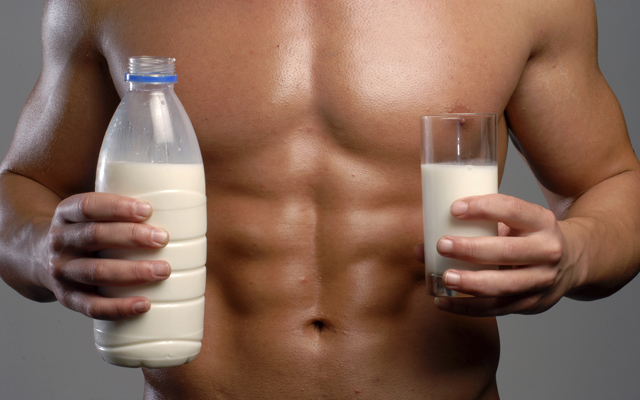As delicious as it might sound, chocolate milk alone can’t replace supplementing with whey protein for athletic recovery.
In a new study, researchers found chocolate milk did not enhance muscle hypertrophy following three months of weight training (1). Published in the Journal of Applied Physiology, Nutrition and Metabolism, Cameron Mitchell and colleagues tested the effects of daily consumption of approximately two cups of chocolate milk versus a placebo with a normal diet on muscle building after 12 weeks of weight training in young and older men.
The authors theorized that, “Because older men are resistant to anabolic stimuli such as resistance exercise and protein provision, it seems likely that an even greater dose of milk or protein would be required to detect and ergogenic effect in older men. It is also possible that the previously described anabolic resistance is responsible for the lack of detectible type II fiber hypertrophy [muscle building] in older men in this study.”
The researchers used one percent chocolate milk that provided 320 calories, 14 grams of protein, five grams of fat, and 54 grams of carbohydrate or a placebo beverage that was mostly sugar. Both drinks were consumed immediately after training and with breakfast on non-training days.
Traditionally, protein supplementation has been shown to enhance the muscle-building effects of resistance exercise (2). However, the dose and type plays an important role in how effective supplementation can be (3).
As noted by the authors of this study, another issue with the lower protein quantity in chocolate milk is the anabolic resistance of muscle building to both exercise and protein intake in older adults (4). This anabolic resistance results in lower relative gains in muscle size and strength after resistance exercise and increases the amount of protein needed (5). Proper protein supplementation has been shown to enhance muscle building effects of resistance exercise in this population (2).
From the results of this study it may be more practical to use a higher dose of high-quality protein like whey offered by Isagenix to get the best muscle-building effects for both young and old alike Isagenix IsaLean Shakes contain 24 grams of protein predominantly from whey, for example. In comparison, chocolate milk contains only 14 grams of protein per two cups. A serving of chocolate milk after exercise would represent less protein and substantially more calories. In addition, to get a similar amount of protein in IsaLean Performance Protein that has 36 grams of protein, it would take drinking close to six cups of chocolate milk containing a whopping 75 grams of sugar.
References
- Mitchell CJ, Oikawa SY, Ogborn DI et al. Daily chocolate milk consumption does not enhance the effect of resistance training in young and old men: a randomized controlled trial. Applied Physiology, Nutrition, and Metabolism 2014.
- Cermak NM, de Groot LC, Saris WH, van Loon LJ. Protein supplementation augments the adaptive response of skeletal muscle to resistance-type exercise training: a meta-analysis. The American journal of clinical nutrition 2012;96:1454-64.
- Churchward-Venne TA, Breen L, Di Donato DM et al. Leucine supplementation of a low-protein mixed macronutrient beverage enhances myofibrillar protein synthesis in young men: a double-blind, randomized trial. The American journal of clinical nutrition 2014;99:276-86.
- Cuthbertson D, Smith K, Babraj J et al. Anabolic signaling deficits underlie amino acid resistance of wasting, aging muscle. The FASEB Journal 2005;19:422-4.
- Yang Y, Breen L, Burd NA et al. Resistance exercise enhances myofibrillar protein synthesis with graded intakes of whey protein in older men. British Journal of Nutrition 2012;108:1780-8.





